Coordinación
Una coordinación sólida puede evitar vacíos y duplicaciones en las respuestas humanitarias, así como garantizar que los PTM complementen otros tipos de asistencia. Sin embargo, el informe del «Estado Global de los Programas de Transferencias Monetarias» de la CALP Network muestra que la coordinación de la asistencia en efectivo es vista como débil y ad hoc, y que esto está teniendo graves repercusiones operativas.
Los donantes, las ONG y los líderes de los grupos de trabajo de transferencias monetarias (GTM) han pedido claridad sobre tres temas principales relacionados con la coordinación de la asistencia en efectivo:
- Quién debe ser responsable de asegurar una coordinación eficaz de la asistencia en efectivo;
- Cuál es la función y el mandato de los grupos de trabajo de transferencias monetarias, incluso en relación con las transferencias monetarias multipropósito;
- Cómo se debe dotar de recursos a la coordinación de asistencia en efectivo.
Tenemos que basarnos urgentemente en lo que funciona y proporcionar claridad a nivel mundial sobre las preguntas arriba mencionadas, adaptándonos a los diferentes contextos. Hace mucho tiempo que se deberían haber tomado decisiones claras basadas en necesidades operativas y no en la política de las agencias.
Prioridades actuales
El objetivo de la CALP Network es contribuir a seguir progresando en este tema en tres niveles: apoyar a los grupos de trabajo de transferencias monetarias a nivel regional; contribuir a soluciones prácticas para la coordinación de la asistencia en efectivo a nivel mundial; y convocar una discusión basada en la evidencia sobre temas clave, destacando puntos de decisión críticos y oportunidades de progreso.
Contenido destacado

Cash Coordination Tip Sheet
Guidelines and Tools
This tip sheet sets out established best practice, key guidance and resources for all aspects of cash coordination, intended as a clear, accessible and action-oriented guide for those engaged in coordination of cash and voucher assistance (CVA) at the field level.

Introducing the Cash Coordination Tip Sheet
Webinar
The CALP Network has developed a tipsheet setting out established best practice and key guidance and resources for all aspects of cash coordination, intended as a clear, accessible and action-oriented guide for those engaged in coordination of cash and voucher assistance at the field level.

Cash Coordination: A proposal from members in MENA
Blog Post
Earlier this year the CALP Network undertook regional consultations to explore options for cash coordination. This blog lays out recommendations from participants from the Middle East and North Africa who sketched out what cash coordination, and coordination more broadly, could look like in future to support a more effective, efficient and accountable response.
Últimos recursos
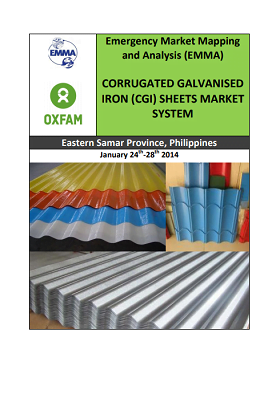
EMMA on CGI Sheets in Eastern Samar, Philippines
Report
Super Typhoon Haiyan (locally known as Yolanda) made landfall on the 8th of Nov’13 and left a trail of destruction along its path. It is estimated that 14 million people were affected and 4.1 million were displaced in the Philippines as a result of this super typhoon.Eastern Samar province of the...
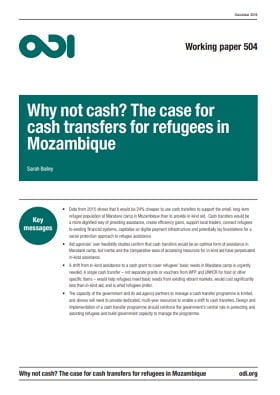
Why not cash? The case for cash transfers for refugees in Mozambique
Report
There are two areas where cash transfers could play a role in humanitarian assistance in Mozambique: in response to natural disasters and in support of the long-term refugee population. This working paper focuses on refugees. Why not cash? The case for cash transfers for refugees in Mozambique is one of a...

Evaluation of the Kenya Hunger Safety Net Programme Phase 2
Report
The report summaries key findings from Hunger Safety Net Programme Phase 2 Qualitative impact study conducted in August 2016. The report integrates interesting infographics that depict the findings in an easy to read and understand format

Terms of Reference Geneva-based Cash Working Group – January 2016
Report
Terms of Reference Geneva-based Cash Working Group – January 2016

Data management and protection starter kit: Tip sheet 1: Privacy Impact Assessment (PIA)
Guidelines and Tools
A Privacy Impact Assessment (PIA) is a systematic analysis of the potential privacy risks related to data collected during program implementation. A PIA analyzes threats and risks to program data, including any legal and environmental factors, and develops mitigation strategies. PIAs help humanitarians...

Development of Training Modules on the Fundamental Concepts of Cash and Voucher Programming
Guidelines and Tools
The CALP Network is in its first year of a 5 year strategy. The first year has been marked by opening up the CALP Network’s membership to its wider community of practice, with a significant growth in membership expected in 2016,
the development of a Board of Directors, made up of up to 13...

DFID Shock-Responsive Social Protection Systems research: Literature review
Report
DFID has commissioned research into Shock-Responsive Social Protection systems, to further understand the nature of the interaction between social protection, humanitarian and disaster risk management systems and ways in which long-term social protection systems can be scaled up to
provide support in...
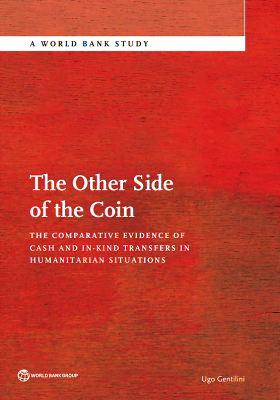
The Other Side of the Coin. The comparative evidence of Cash and in kind transfers in humanitarian situations
Report
This paper reviews the existing evidence on the performance of alternative transfer modalities across humanitarian sectors, including cash transfers, vouchers,and in-kind assistance (food and non-food). These were assessed in relation to food security, nutrition, livelihoods, health, education, and...
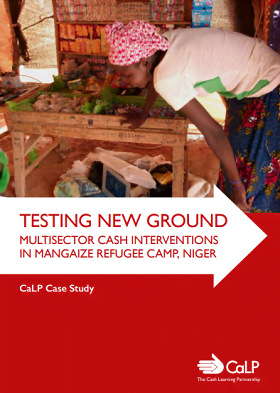
Testing new ground. Multisector cash interventions in Mangaize refugee camp Niger
Report
In the midst of the Mali refugee crisis in Niger, UNHCR implemented one of the first multisector cash transfer projects in Mangaize refugee camp in 2015, providing refugees with grants covering non-food items, hygiene, shelter and livelihood needs. The cash project came on the heels of a successful food...

Scale Right: Coordinating Improved Cash Assistance in Greece
Report
Europe is still reeling from the largest refugee crisis it has experienced since World War II. During the first half of 2015 Greece saw an average of 3,000 refugees arriving daily by sea onto the island of Lesvos. While the number of new arrivals—fleeing war in Syria, conflicts in Iraq, Afghanistan and...

Scaling Up Humanitarian Cash Transfers in Nepal
Case Study
The Nepal earthquake has a number of lessons for the global debates on scaling up cash both at the level of cash responses themselves and in the more transformational way envisaged by the High Level Panel through which cash can disrupt the established humanitarian system. Humanitarian cash transfers after...

Research: Refugees Can Bolster a Region’s Economy
Report
The world’s refugee population has increased sharply in recent years, leading governments to argue over which countries should take in people displaced by war or other calamities. At the core of this debate is cost: refugees are usually considered an economic burden for the countries that take...

Working Paper 3: Shock-Responsive Social Protection in the Sahel: Community Perspectives
Report
This is the third in a series of working papers from the ongoing Shock-Responsive Social Protection Systems research. Together, the set of papers explore perspectives about the interface between social protection, humanitarian assistance and disaster risk management (DRM), to complement the formal...
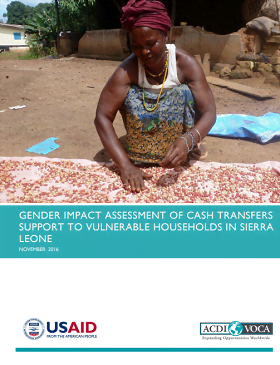
Gender impact assessment of cash transfers support to vulnerable households in Sierra Leone
Report
This report outlines the findings and recommendations from a qualitative assessment carried out to complement and further develop the findings from a recently concluded quantitative study of SNAP+ in order to better understand the driving factors behind behavior during the Ebola crises. The quantitative...

Cash transfers programming in the Pacific: A Feasibility Scoping Study
Report
The use of Cash Transfer Programming (CTP) to provide humanitarian assistance so that people may access the goods and services they need before, during and following a crisis has been gaining momentum over the past decade. Despite the considerable use of cash and vouchers by government and non-state...

Baseline Assessment for Education Cash Transfer Programming for IDPS in Dahuk Governance
Report
REACH, in collaboration with UNICEF, conducted a Baseline Assessment of Access to Education among Internally Displaced Persons in the Dahuk Governorate of Iraq. This assessment aimed to improve the efficiency of humanitarian cash assistance by implementing partners for increased access to education in the...
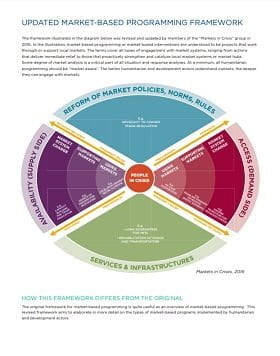
Updated Market-Based Programming Framework
Guidelines and Tools
The Market Based Programming framework was designed to help humanitarian actors understand market approaches in fragile contexts. Some degree of market analysis is a critical part of all situation and response analyses. At a minimum, all humanitarian programming should be “market aware”. The better...

Organizational Capacity Assessment Tool (OCAT) User Guide
Report
The Organizational Capacity Assessment Tool (OCAT) comprises a User Guide, Tool Worksheets for use in scoring and graphing results respectively, and a Recommendations Matrix. Assessment is done in six categories of organizational capacity, each with a series of criteria. Discussion and scoring on each of...
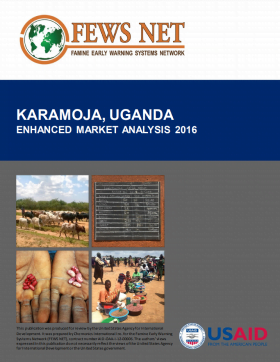
Karamoja, Uganda: Enhanced Market Analysis
Report
The Market Fundamentals reports serves as starting points for providing efficient and effective market-based response decision support for both emergency and development programs in Karamoja Region of Uganda. It examines the appropriateness and feasibility of modality response options for the region.
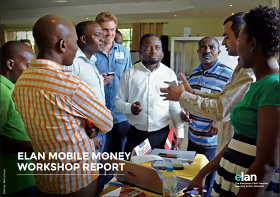
ELAN Mobile Money Workshop Report
Report
The Electronic Cash Transfer Learning Action Network (ELAN) hosted two mobile money workshops in January 2016 in Dakar (Senegal) and in Gisenyi (Rwanda). The workshops were attended by 52 individuals from seven countries across West Africa and the Great Lakes region representing 16...